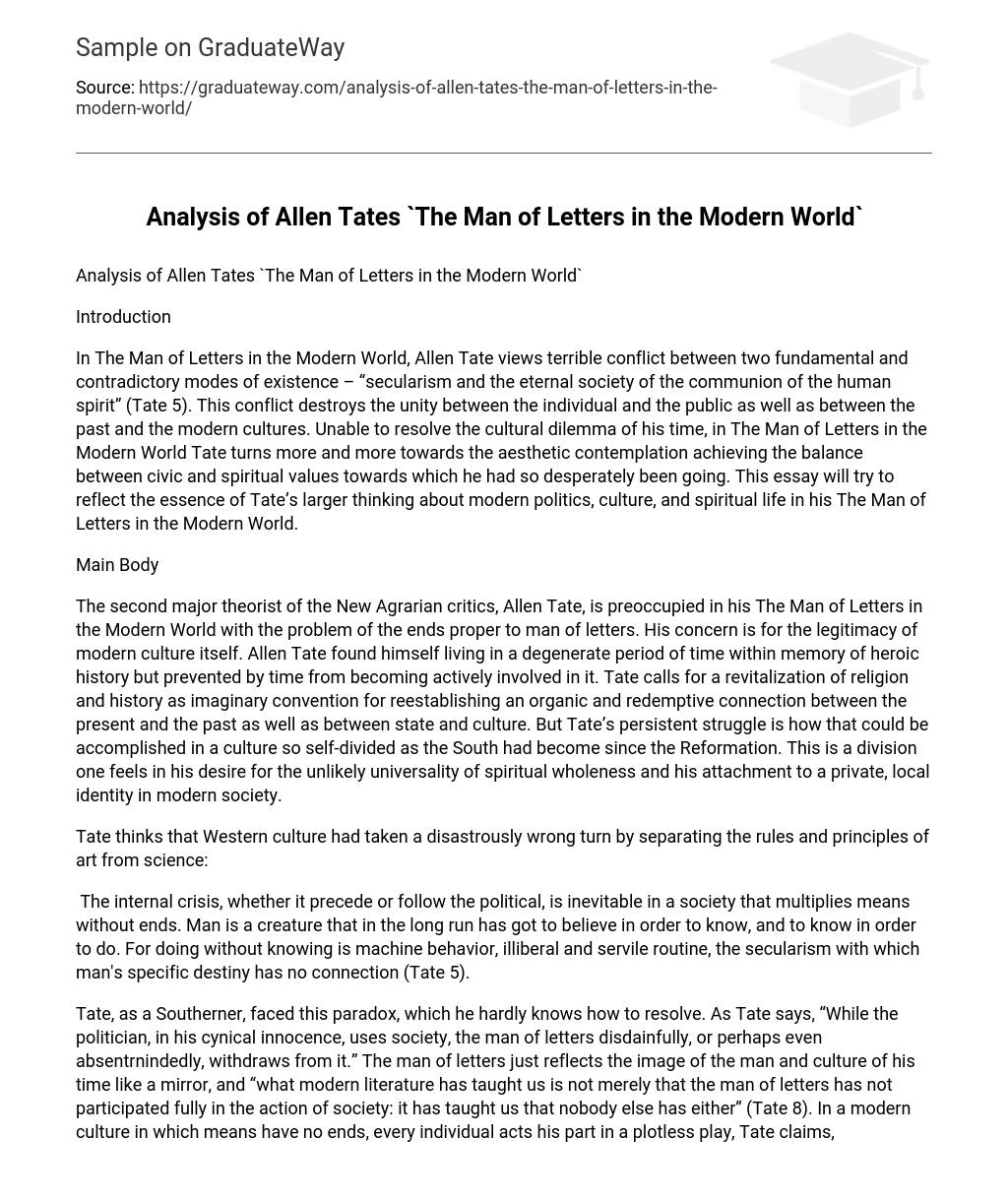Introduction
In The Man of Letters in the Modern World, Allen Tate views terrible conflict between two fundamental and contradictory modes of existence – “secularism and the eternal society of the communion of the human spirit” (Tate 5). This conflict destroys the unity between the individual and the public as well as between the past and the modern cultures. Unable to resolve the cultural dilemma of his time, in The Man of Letters in the Modern World Tate turns more and more towards the aesthetic contemplation achieving the balance between civic and spiritual values towards which he had so desperately been going. This essay will try to reflect the essence of Tate’s larger thinking about modern politics, culture, and spiritual life in his The Man of Letters in the Modern World.
Main Body
The second major theorist of the New Agrarian critics, Allen Tate, is preoccupied in his The Man of Letters in the Modern World with the problem of the ends proper to man of letters. His concern is for the legitimacy of modern culture itself. Allen Tate found himself living in a degenerate period of time within memory of heroic history but prevented by time from becoming actively involved in it. Tate calls for a revitalization of religion and history as imaginary convention for reestablishing an organic and redemptive connection between the present and the past as well as between state and culture. But Tate’s persistent struggle is how that could be accomplished in a culture so self-divided as the South had become since the Reformation. This is a division one feels in his desire for the unlikely universality of spiritual wholeness and his attachment to a private, local identity in modern society.
Tate thinks that Western culture had taken a disastrously wrong turn by separating the rules and principles of art from science:
The internal crisis, whether it precede or follow the political, is inevitable in a society that multiplies means without ends. Man is a creature that in the long run has got to believe in order to know, and to know in order to do. For doing without knowing is machine behavior, illiberal and servile routine, the secularism with which man’s specific destiny has no connection (Tate 5).
Tate, as a Southerner, faced this paradox, which he hardly knows how to resolve. As Tate says, “While the politician, in his cynical innocence, uses society, the man of letters disdainfully, or perhaps even absentrnindedly, withdraws from it.” The man of letters just reflects the image of the man and culture of his time like a mirror, and “what modern literature has taught us is not merely that the man of letters has not participated fully in the action of society: it has taught us that nobody else has either” (Tate 8). In a modern culture in which means have no ends, every individual acts his part in a plotless play, Tate claims, a play of withdrawal.
Tate thinks about Europe in the past as a community that has the kind of unity with a peculiar balance of culture and more advanced worship. According to Tate, it is this special combination that made European world, and it is this that men transmit in the act of living together. This world, Tate states, is almost gone. Rather than thinking what is good, contemporary men and women think if it will work. The modern civilization, according to him, has only half of a whole life – the mechanical power of an abstracted internal burning engine instead of the whole, spiritual life. Technology without love and faith is, he thinks, barbarism quite simply: but barbarism perfected, violent and depressive, not the old barbarism of forest and the plain (Nelson 89). Tate’s solution is to bring about a return to vigorous culture. Tate wants to preserve the culture of the modern and future society, and he believes that it is “the true province of the man of letters” (Tate 16). Their service is to preserve and refine culture by means of supervision of language.
Conclusion
Tate’s hope is that the modern man of letters will establish a spiritual supervision of the culture of language. As Tate says, “the letter then is the point to which the man of letters directs his first power, the power of discrimination” (Tate 14). Such a service, he claims, the man of letters must carry as his Cross. Tate, then, as a founding father of the New Agrarian movement, heroically mounts this defense of a tradition and culture assuring that only the man of letters can perform this task today.
Works Cited
Nelson, R. Aesthetic Frontiers: The Machiavellian Tradition and the Southern Imagination. University Press of Mississippi: Jackson, MS, 1990.
Tate, A. The Forlorn Demon: Didactic and Critical Essays. Regnery Publishing, Inc.: Chicago, 1953.





